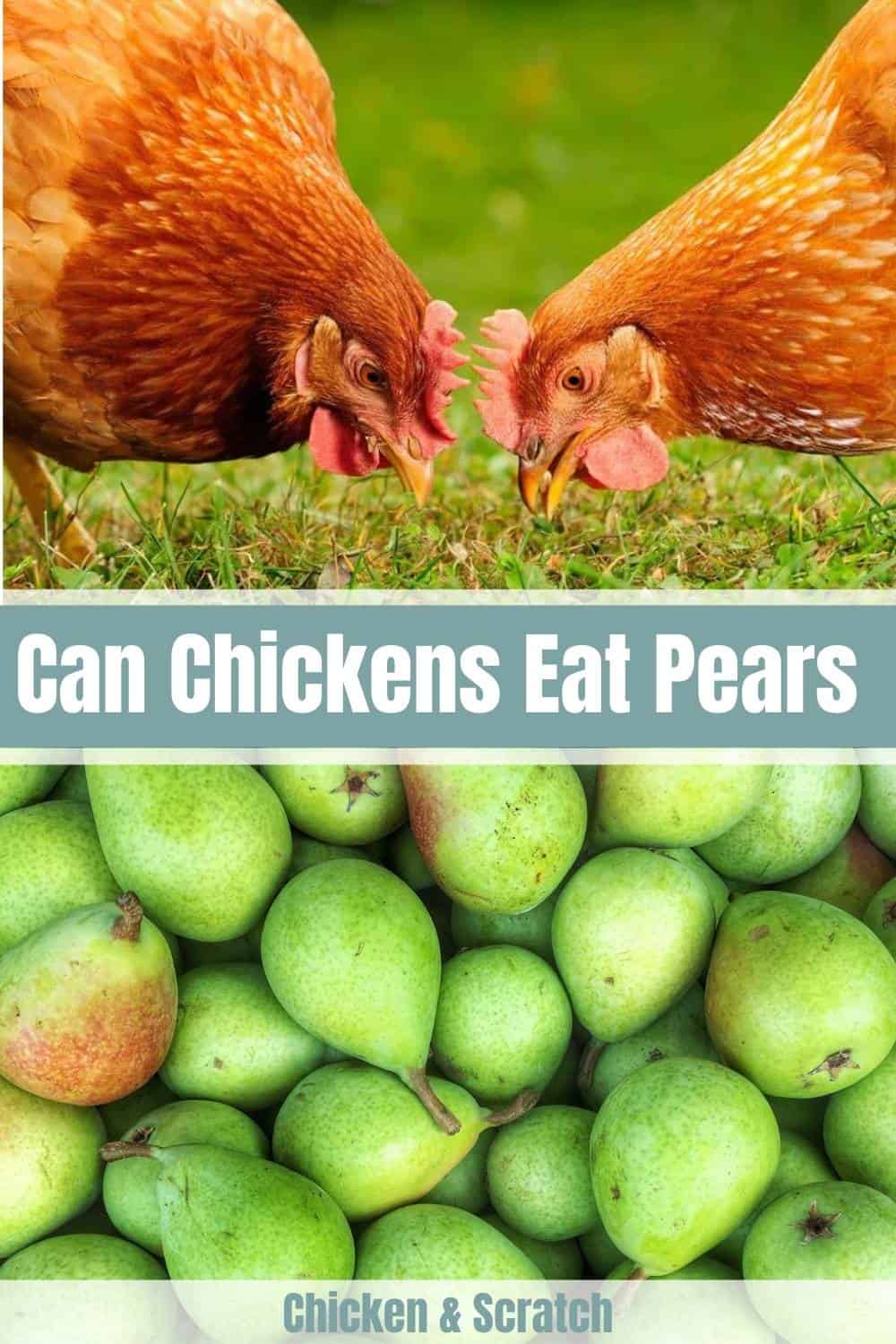If you’re looking for nutrient-rich and low-calorie fruits to give your chickens, consider giving them pears. Pears are enriched with a wide range of minerals and vitamins, which help maintain your chickens’ health. As long as the pears are safe to eat and your chickens love them, you can include pears as a treat in your chickens’ diet.
This article will cover
- Can Chickens Eat Pears?
- Are Pears Healthy For Chickens?
- What To Consider When Giving Your Chickens Pears?
- 5 Things To Note When Feeding Your Chickens Pears
Can Chickens Eat Pears?
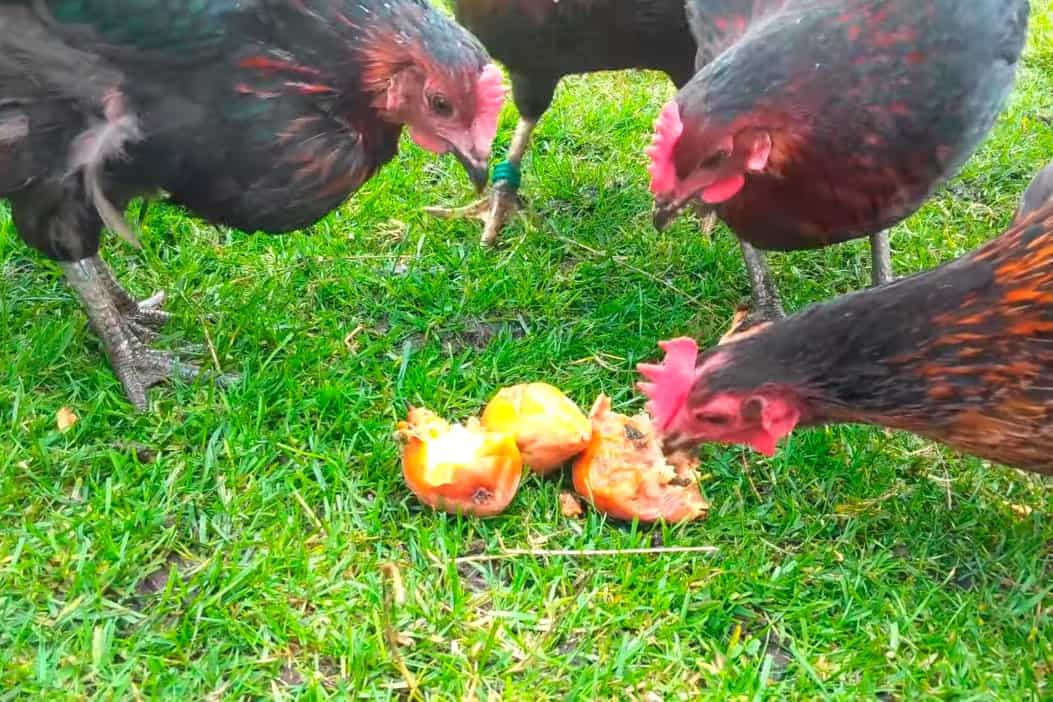
Pears are excellent sources of nutrients for your chickens. Even though they don’t contain all the dietary requirements your chickens need, they help with egg production in your hens. Pears aren’t the tastiest of fruits, but chickens love eating them all the same. Here are some things you should know when giving your chickens pears.
Skin
Pear skins are safe for eating. You don’t need to remove them from the fruit. Peels contain large quantities of plant compounds, minerals, and vitamins.
Besides, the skin is packed with a high amount of antioxidants such as quercetin, which protects your chickens from the effects of free radicals and other diseases. Giving your chickens pear skins to eat increases their nutrient intake and satiety.
Flesh
This is the juiciest and softest part of a pear. It is packed with a lot of nutrients as well. You can dice the flesh or mash them smoothly for your chickens to eat. Ensure you give your chickens pears that are in good condition.
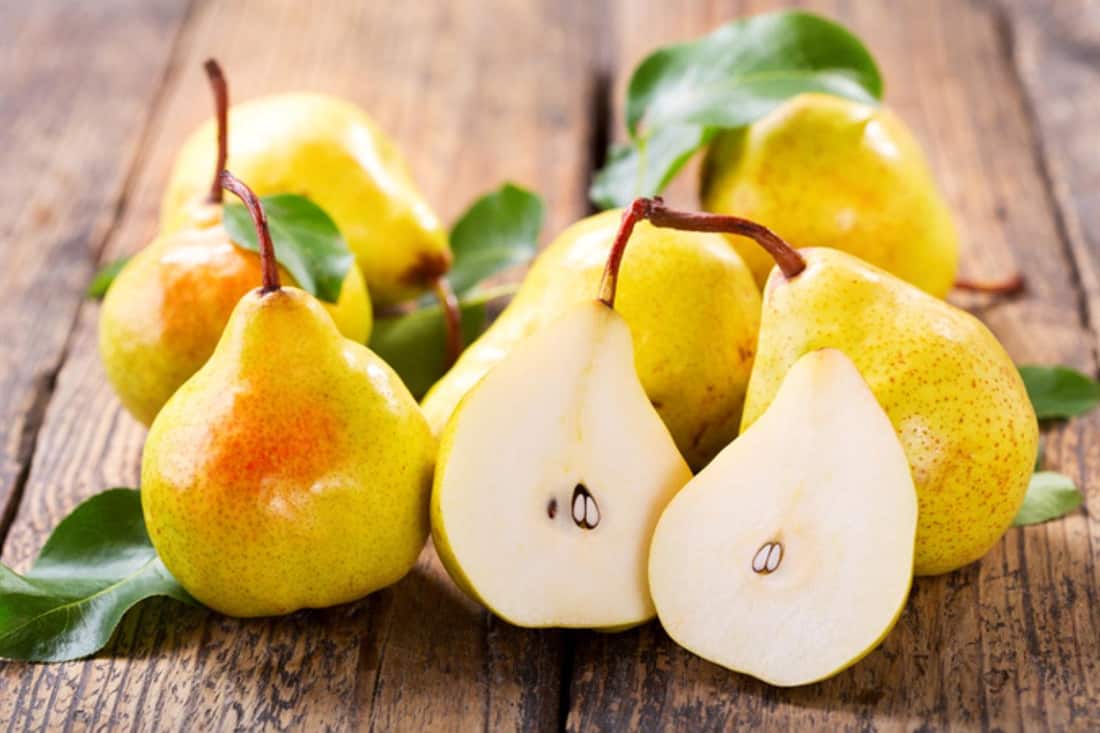
Seeds
Pear seeds contain some amounts of cyanide. Cyanide is a deadly chemical that tampers with your chickens’ system. When present in the body, it stops oxygen from getting to the cells. Since there’s no cellular respiration, the cells die within minutes. As such, the effects of cyanide are immediate. Besides, it’s not recommended for chickens to eat pear seeds. They are harsh and bitter; there’s no point giving your chickens what they’ll turn their noses at.
Intake
Pears can be consumed in different forms. You can give your chickens fresh or cooked ones; you can also give them processed or dry ones. Regardless of the form in which your chickens consume the pears, they’ll get all the nutrients.
What matters is that the pears are safe for your chickens to eat. For instance, if you’re buying processed ones for your chickens, ensure they contain no dangerous chemical preservatives. If you’re buying fresh fruits, inspect properly for bacteria contamination.
In addition, don’t overfeed your chickens with pears. Excessive amounts can lead to health complications and make your chickens addicted such that they stop eating their regular feed. Your chickens should be more than two weeks old before you give them pears as well.
Are Pears Healthy For Chickens?
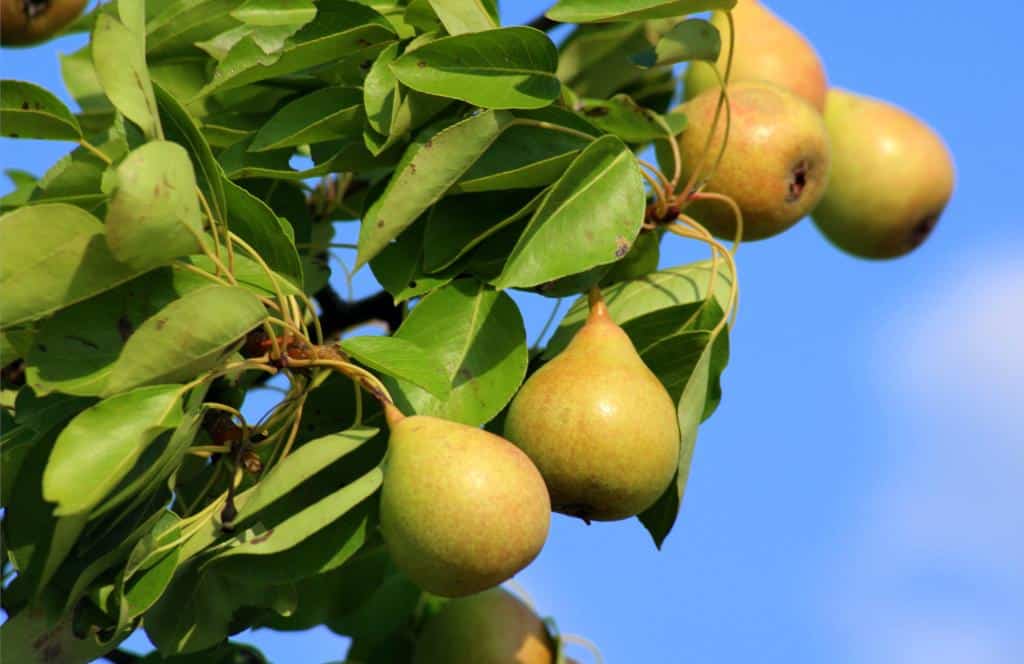
Pears contain water and essential nutrients. They provide a wide range of health benefits such as improving digestion and hydration, etc. If you’re looking for fruits to make your chickens happy and healthy, pears are the right choice.
Keeps your chickens hydrated
Food and water are some of the essentials chickens shouldn’t lack. Lack of both or one of these essentials results in health complications. Either you’re breeding chickens for egg production, meat, or both, you have to ensure they are fed and hydrated always. Since pears contain 80% water, including them in your chickens’ diet will keep them hydrated as much as possible.
Provides antioxidants
Antioxidants are compounds such as vitamins A and C, flavonoids, etc., that help fight free radicals, combat diseases, and keep your chickens healthy. Pears provide your chickens with enough antioxidants for optimal health and egg-laying duties.
Improves blood circulation
Pears contain high levels of copper and iron, which promote blood circulation in the body. Blood circulation helps vital body parts such as the heart to function correctly and enhances the transportation of white blood cells all through the body and cellular respiration. Without proper blood circulation, your chickens are at risk of sudden death syndrome.
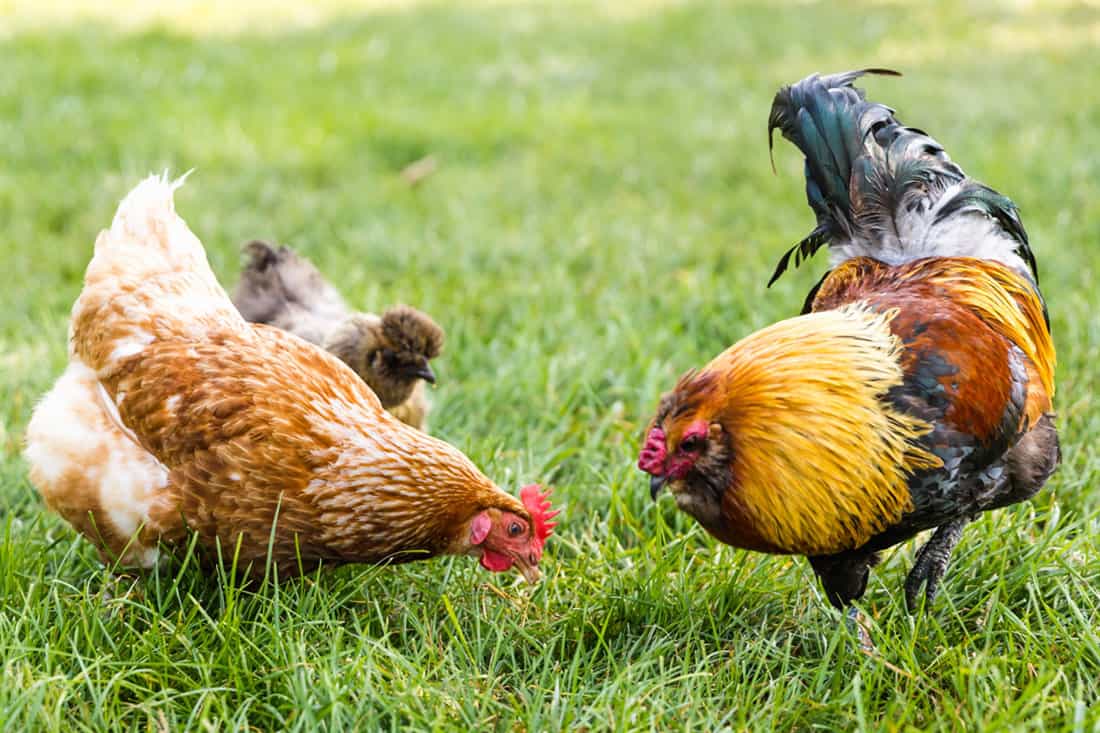
Regulates heart health
Just like humans, chickens are susceptible to heart issues too. For example, chickens can die of heart attack due to several causes. As such, you need to feed your chickens with foods that contain high amounts of potassium to help regulate their heart health, enhance blood flow, and reduce blood pressure. Fortunately, pears have a good amount of potassium.
Maintain bowel health
Pears contain dietary fiber, which helps to relieve or fight constipation. It further reduces the risk of heart diseases, cancer, and obesity. Fiber isn’t digested and absorbed by the body, but it prevents watery droppings and hemorrhoids in your chicken’s bowel and eases the passage of stool. If you find that your chickens have difficulty stooling, you can include fruits like pears in their diet.
On the other hand, pears contain large amounts of glucose and fructose, which aren’t good for your chickens when consumed in excess. Therefore, you shouldn’t consider pears as your chickens’ main diet.
Nutrition of Pears and Their Benefits to Chickens (per medium-sized pear)
| Nutrient | Amount | Benefits for Chickens |
|---|---|---|
| Calories | 102 | Energy source |
| Total Fat | 0.2g | Supports cell function |
| – Saturated fat | 0.0g | Minimal amounts |
| Sodium | 2mg | Safe in low amounts |
| Total Carbohydrates | 27g | Energy source |
| – Dietary Fiber | 6g | Aids digestion |
| – Sugars | 17g | Quick energy |
| Protein | 1g | Supports growth |
| Vitamin C | 7.5mg | Boosts immunity |
| Potassium | 206mg | Muscle & nerve function |
| Calcium | 22mg | For eggshell formation |
| Iron | 0.3mg | Aids in oxygen transport |
Data source: USAD
What To Consider When Giving Your Chickens Pears?
There are over 30 varieties of pears. However, three types are common – European winter pears, European fall pears, and Asian pears. You might not get all the varieties at the same time. The time of the year determines the available types for you to buy. To tell if the pears are of good quality, here are some things that should influence your decision.
Stone cells
Since your chickens can’t eat pear stones, consider choosing the varieties that have fewer stone cells. Even though all pear varieties have stones, they differ in amount. If you’re picking the pears from the trees, do so before they are fully ripe to prevent many stone cells from forming in the pears.
Picking
Another way to know if a pear is in good condition and fully ripe is when it easily detaches from the tree. If you have to exert a lot of effort before separating the fruits from the stem, then such pears might not be fully ripe.
Texture
Ripe pears shouldn’t be hard as stone when you squeeze them. They shouldn’t be too soft either, as that means they are overripe. A good pear should give a little when you press it. If it doesn’t, your chickens won’t enjoy eating it.
Color
Not all pears change colors when ripe. In some varieties, the change is slight, while others like the Bartlett pear changes from green to yellow and becomes softer. This variety is considered the juiciest of pears. For pears that don’t change color, squeeze it to see if it gives. If it does, it’s good to eat. You can also ripen your pears at room temperature.
Appearance
You should inspect thoroughly for blemishes on the pears before you give your chickens. Usually, these blemishes are caused by bugs that bite the fruits on the trees.
Such pears are also suitable for eating, but ensure they are organically grown. Pears grown with pesticides aren’t safe for consumption. You can grow pears on your property if you want to be sure of what you give your chickens or buy from local farmers.
5 Things To Note When Feeding Your Chickens Pears
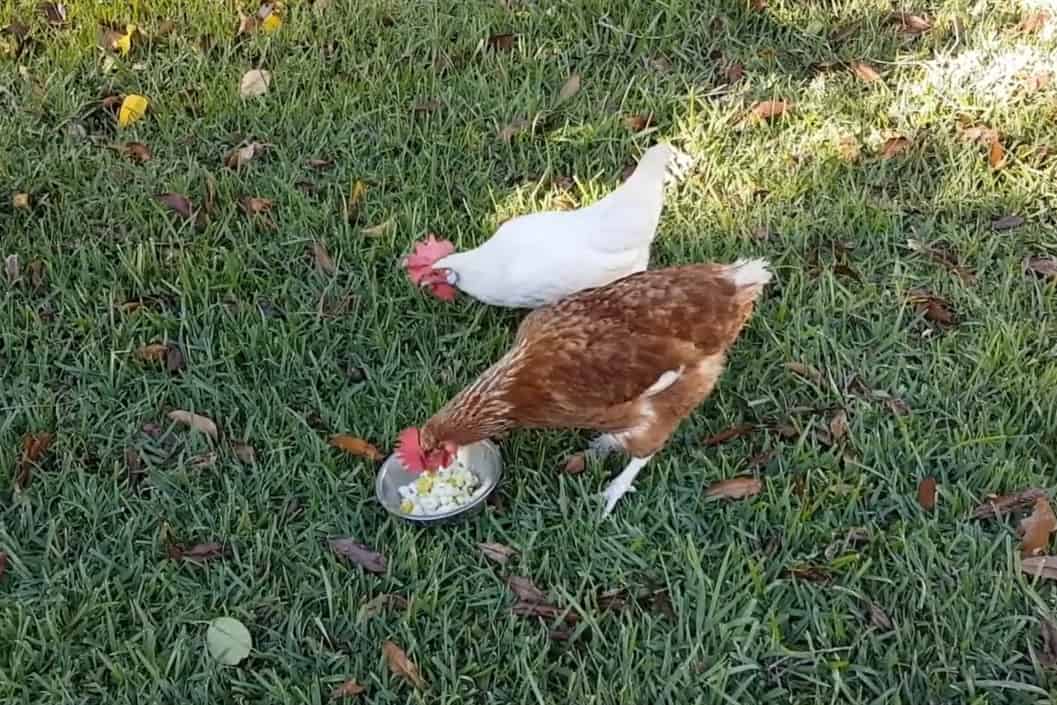
Giving your chickens pears to eat doesn’t require much effort. However, you must keep certain things in mind.
Originally-grown
Either you’re feeding your chickens fresh or cooked pears, ensure the fruits are grown organically. Organic fruits are grown without the use of chemicals such as pesticides, herbicides, etc. As such, they are more beneficial than their chemically-grown counterparts.
For instance, organic fruits are high in antioxidants with no or little risk of bacteria contamination, while chemically-grown ones can be dangerous to health. Chickens are very susceptible, and a strain of contamination in their foods can kill them all.
Ripeness
Feed your chickens with only ripe pears. Unripe pears have high acidic content, which can cause gastrointestinal problems and discomfort to your chickens. They aren’t good for your chickens. Chickens can choke on them and die in the process. If you can’t get ripe pears, leave the available ones at room temperature to ripen or serve your chickens with other ripe fruits they love to eat.
Serving
Chickens can eat whole pears as long as they’re soft, but to avoid your chickens choking on them because of their size, you should cut them into small cubes. This way, your chickens will find it easier to carry the cubes in their mouths and swallow them. If the pears are soft enough, you can mash them up before you give your chickens.
Boiling
If you want to boil the pears, choose naturally firm varieties. Soft varieties won’t withstand boiling. Remove the stones and cover them with cold water in a pan. Set on medium heat.
You can add other fruits like berries, raisins, etc., to the pan to make fruit salad for your chickens. Don’t add sweeteners to prevent the risk of your chickens consuming excess sugar. Ensure the pears remain submerged in water throughout to avoid uneven cooking or discoloration.
Leftovers
Don’t leave the pears in your chickens’ coop all day. As soon as they are done eating, take away the leftovers and clean the coop. The smell of pears can attract predators or pests to the coop. Besides, it makes the coop dirty and smelly, which threatens your chickens’ health.
Summary
If your chickens love pears, don’t deny them the pleasure and benefits of eating them. Pears are safe for your chickens to eat, not to talk of the many health benefits they provide. Choose good-quality pears and serve them in any form to your chickens. However, don’t replace their regular diet with pears and other treats.
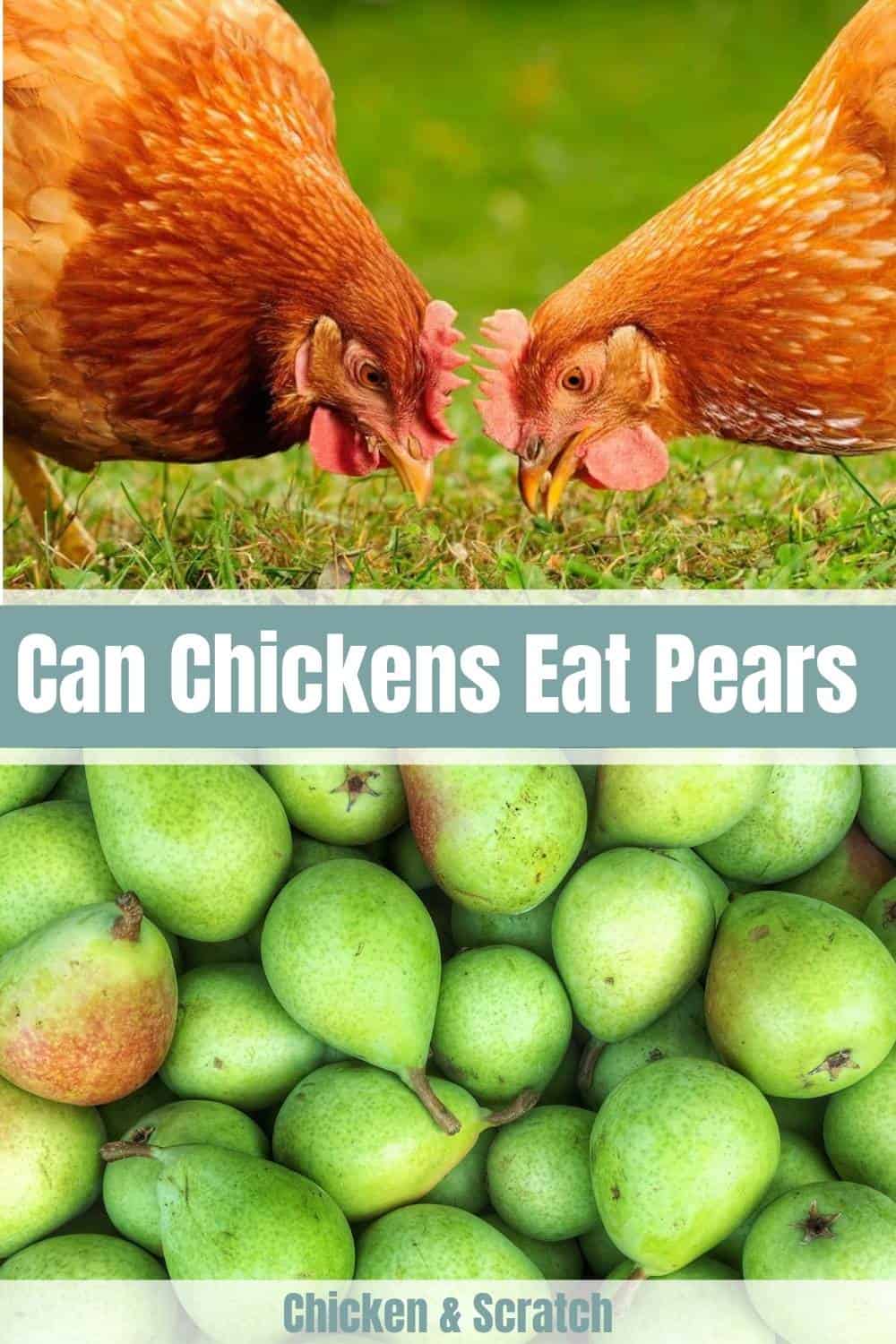

Joseph Hudson has been raising chickens for over 15 years. In 2018, he completed the Agriculture & Natural Resources program at Mt. San Antonio College. He currently raises over 1400 chickens on his 7.5-hectare farm. He keeps sharing his experience on raising healthy and happy chickens on Chicken Scratch The Foundry.
